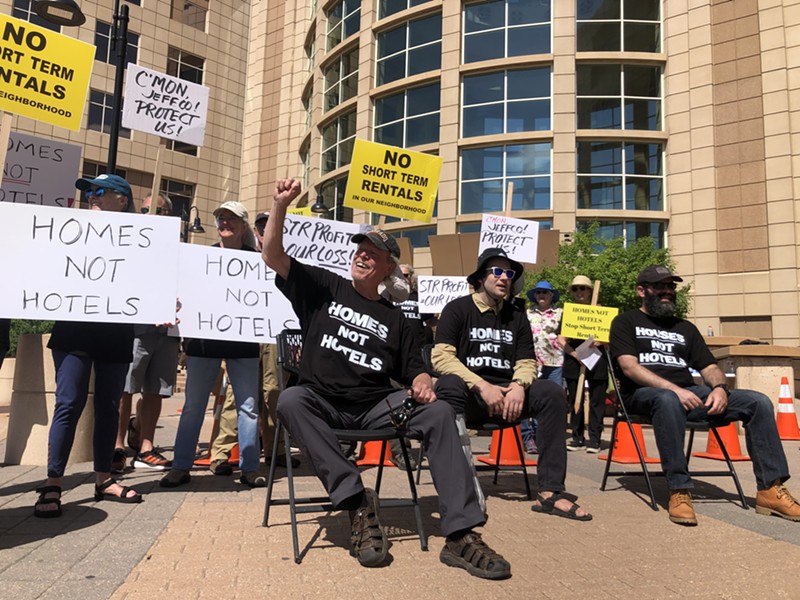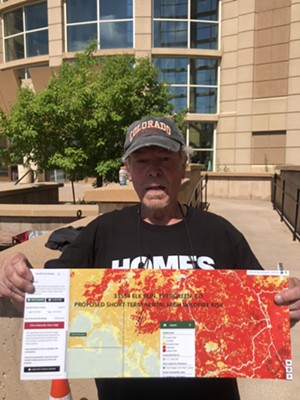"Nothing's happened," says Randy Leonard, one of the leaders of the Foothills Community Action Group, which was formed to bring attention to the STR issues and coordinated a protest at the Jefferson County Courthouse on July 14.
"Crickets," he adds.
The group alleges that county officials have turned a blind eye to its concerns since making several promises at a community meeting in Evergreen on April 27 related to dealing with the rental properties.
Residents say that STRs have been problematic because of lax county regulations and little enforcement. FCAG leaders say they are fed up with Jeffco dragging its feet.
The activist group, which formed in March, says it is currently made up of 82 residents who feel that the proliferating STR market is causing numerous issues across the county. It hosted the April 27 meeting to discuss the issue with Jeffco's director of planning and zoning, Chris O'Keefe, who acknowledged what was going on and said he was willing to pursue solutions.
"A timeline for public hearing and work on the frequently promised rewrite of Jeffco's failing STR resolutions was announced at that meeting," Leonard says. "Those times have come and gone, and there is no evidence of any of the promised efforts to save our residential neighborhoods with reasonable regulation and enforcement."
Leonard claims that O'Keefe and other Jeffco officials told FCAG that they would hold public hearings by the end of June. According to him, that didn't happen.
"Our hope is to shine a much brighter light on our county's failure to protect its citizens," Leonard says.
Chris Mouton, a Conifer resident who attended the July 14 protest at the courthouse, notes that the STR industry is new and developing, and says it may take some time for legislation to come in to address the new concerns. "It's the wild, wild West, and it's going to take a while, I guess, for governments [and regulations] to catch up," he says. "But they're only going to catch up if we hold them accountable."
The biggest issues concerning residents when it comes to STRs have been wildfire risks, guests throwing loud and disruptive parties, tourists who are unaware of neighborhood property lines and trespass, increasing property taxes, the pricing out of essential workers, unsustainable use of community water sources and septic systems, and increased stress on privately maintained roads.
"There was a group of college boys that came in at one point in time," Mouton recalls. "They decided, 'Well, we'll climb to the top of the mountain to see what we can see,' I guess. Well, they're crossing everybody's property lines, they're trespassing on everybody's property.
"You could hear them hooting and hollering all over the mountainside," he adds.
But FCAG's number-one concern is undoubtedly the wildfire risk posed by visitors from places where such natural disasters are not a concern.
According to wildfirerisk.org, Jefferson County has an 88 percent higher risk for wildfire compared to other U.S. counties. Evergreen, specifically, has a 99 percent higher risk.
"We're having the biggest fires in history in Colorado," Leonard says, citing the 2021 Marshall fire on the Front Range, the 2020 East Troublesome fire in Grand County and the 2020 Cameron Peak fire just west of Fort Collins — the biggest in state history.
"I've been evacuated twice for fires so close to my house that we had to leave," he says. "People who live in those [high fire-risk] zones are very cautious," he explains. But that's not necessarily the case for visitors from out of state or even out of the country. "If you come here from Amsterdam and you smoke, you don't even know what high fire danger is. ... It's okay to do that in Amsterdam. You can flick a [cigarette] butt off your deck; it's not going to hurt anything. But here, that's not true."
Leonard says there have been at least "two reports of [STR guests] putting campfires in the yard at an Airbnb during fire danger [season]."
"People are completely unaware of the amount of fire danger if you're not from here," Mouton adds.
"Fires in these neighborhoods are difficult to fight, because most of these neighborhoods have no fire suppression, meaning no fire hydrants," he explains. "So it's the bucket brigade to come and bring water to put a fire out."
While the July 14 protest attracted an older crowd, 33-year-old Dan Gladkov says the issues affect people his age, too.
"I'm a young homeowner," he tells Westword. "I bought my first house up in the foothills...in December."
Gladkov fears that STRs are unjustly inflating the value of the homes in his neighborhood, causing the area to become less affordable for the working class. "Foothills communities are having a huge issue finding staff for restaurants," he says. "I have problems finding contractors, because no one who does contracting can afford to live in the hills."
On top of that, Gladkov claims, the assessed value of his property has gone from $570,000 to $634,000 in the six months since he bought the place. Now he's worried that his property taxes will also increase as a result.
"When you have a large business investment in your neighborhood, the second there's a downturn, they're going to cut and run. They're going to start selling their properties off, [and] that's going to destroy whatever equity you gained because they just want to get their money back," he says. "And I'm going to have to eat it on the losses after Jeffco jacks up my property taxes, because they're saying, 'Oh, your house is worth this much now because this Airbnb down the road sold for four million, so your house is worth this much now.'"
Director O'Keefe has previously acknowledged the Jeffco STR issue, telling Westword in May that there were nearly 1,000 unlicensed STRs in the county. He said that the Jeffco planning and zoning department has a very small enforcement team — despite being such a large county — and that enforcement options for unlicensed rental units are also limited.
While the county can impose a $100 fine on non-compliant owners, it must take them to court first in order to actually collect that fine.
FCAG members want Jeffco's STR regulations to reflect those held by neighboring counties and municipalities, many of which — including Denver — require STRs to operate only out of a host's primary residence.
"I think there's a level of investment for the homeowner at that point to be more involved in what's going on on the property," Mouton says.
The statement adds that community feedback meetings will be held virtually on August 16, in person on August 30 and then virtually again on September 12.














